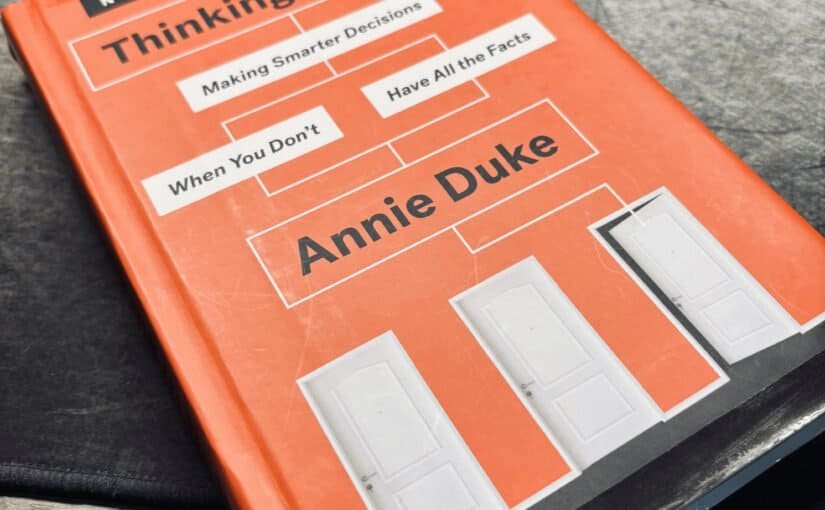Contents
Introduction
Thinking in Bets reframes every decision as a bet on an uncertain future, with two major forces shaping outcomes: the quality of our decisions and luck. Drawing parallels to poker, Annie Duke stresses that we rarely have complete information, so execution skills and flexible thinking often matter more than raw talent.
The main message from the book is:
“When we evaluate the outcome, we can consider two different scenarios:
1. If the outcome is determined by our skills, we should adjust our beliefs accordingly. This will allow us to enhance our skills and make more informed decisions moving forward.
2. If the outcome is a matter of chance, it suggests we lack control over the result. Therefore, it would be illogical to change our beliefs based on such an outcome.”

Thus, the key idea here is separating decision quality from results: we tend to judge choices by outcomes alone (“resulting”), which leads to motivated reasoning and biases like self-serving bias. We accept evidence that confirms our beliefs and dismiss what contradicts them, hampering growth. To improve, Duke urges us to acknowledge uncertainty, treat our beliefs as probabilistic, and update them when new information arises.
She also emphasizes the power of group “buddy systems” for exposing blind spots through diverse viewpoints—encouraging exploratory thought rather than confirmatory echo chambers. Finally, she suggests that backcasting, and premortems can help us look beyond short-term emotions and consider multiple possible futures. By embracing uncertainty, seeking truth over comfort, and reflecting on luck vs. skill, Duke shows how we can sharpen our decision-making and keep learning from our bets.
If you’d like to purchase the book on Amazon, please follow the links below:
1) Paperback
2) Hardback
Below are my key takeaway from the book, which could be applicable to quantitative trading.
Don’t Confuse Outcome with Decision Quality
In trading, a profitable position does not automatically mean the initial choice was well-reasoned. Sometimes a bad trade can still be profitable due to luck, and a good trade can lose money. What matters is a disciplined process built on probability and risk management, not simply short-term gains.
Embrace Probabilistic Thinking and Continuous Updating
Like placing bets at a poker table, traders must continually incorporate new information into their models and assumptions. Viewing trades as bets forces you to assess probabilities, update them as new data arrives (e.g., economic indicators, earnings), and avoid rigidly clinging to outdated beliefs.
Stay Aware of Self-Serving and Confirmation Bias
Traders may blame losses on “bad markets” or “unforeseen news,” while crediting gains solely to skill. Consistently challenging your own biases—especially by seeking out diverse or contrary views—leads to more accurate appraisals of strategy and performance.
Leverage Group Dynamics Wisely
In a trading desk or research team, encourage “exploratory thought” rather than surrounding yourself with individuals who confirm your existing views. Diverse perspectives help unearth unknown risks and refine trading models—especially critical in complex or volatile markets.
Use Mental Time-Travel Tools to Prevent Short-Term Emotional Traps
Techniques like backcasting (imagining success and looking backward to see how it happened) or premortems (imagining failure and identifying what could go wrong) can protect against the emotional pull of short-term price moves. By focusing on the broader probability distribution of outcomes, you temper impulsive decisions and better manage risk over the long haul.
Conclusion
Thinking in Bets when applied to financial markets and quantitative trading, these insights underscore the need for a disciplined, probability-based process. Traders must embrace uncertainty, continually update their beliefs as new market data emerge, and remain vigilant against confirmation bias. Collaboration among team members with varied perspectives can uncover blind spots, while mental time-travel techniques such as backcasting and premortems help traders maintain a long-term view and avoid impulsive moves. By merging Duke’s principles with rigorous risk management and a willingness to adapt, market participants can make more informed bets that stand the best chance of paying off.
If you’d like to purchase the book on Amazon, please follow the links below:
1) Paperback
2) Hardback
Related Reviews
- Review of Untangling Skill & Luck by Michael Mauboussin
- Review of Thinking in Bets by Annie Duke
- Review of Fluke by Brian Klass
Author:
